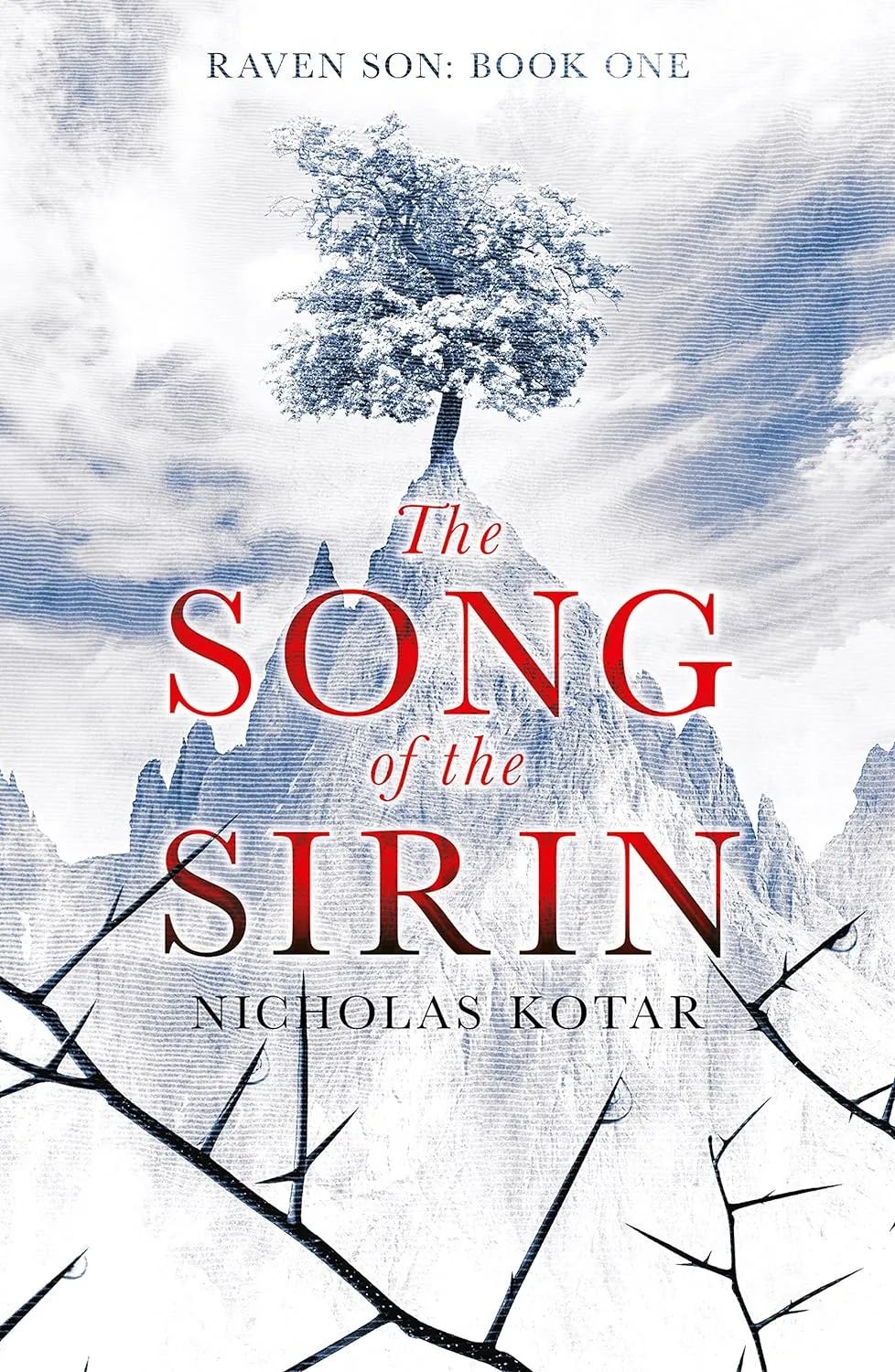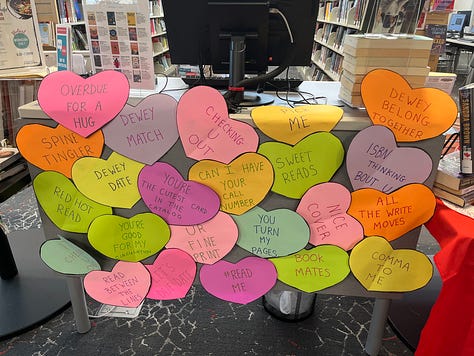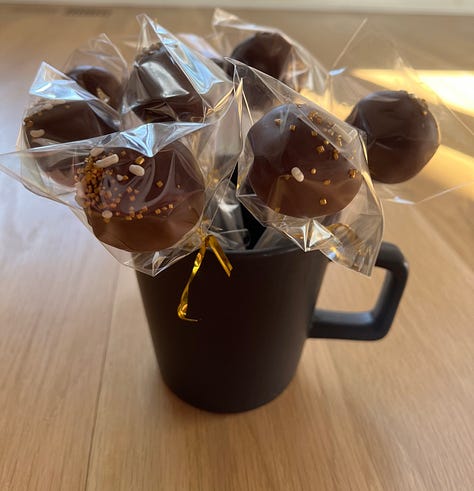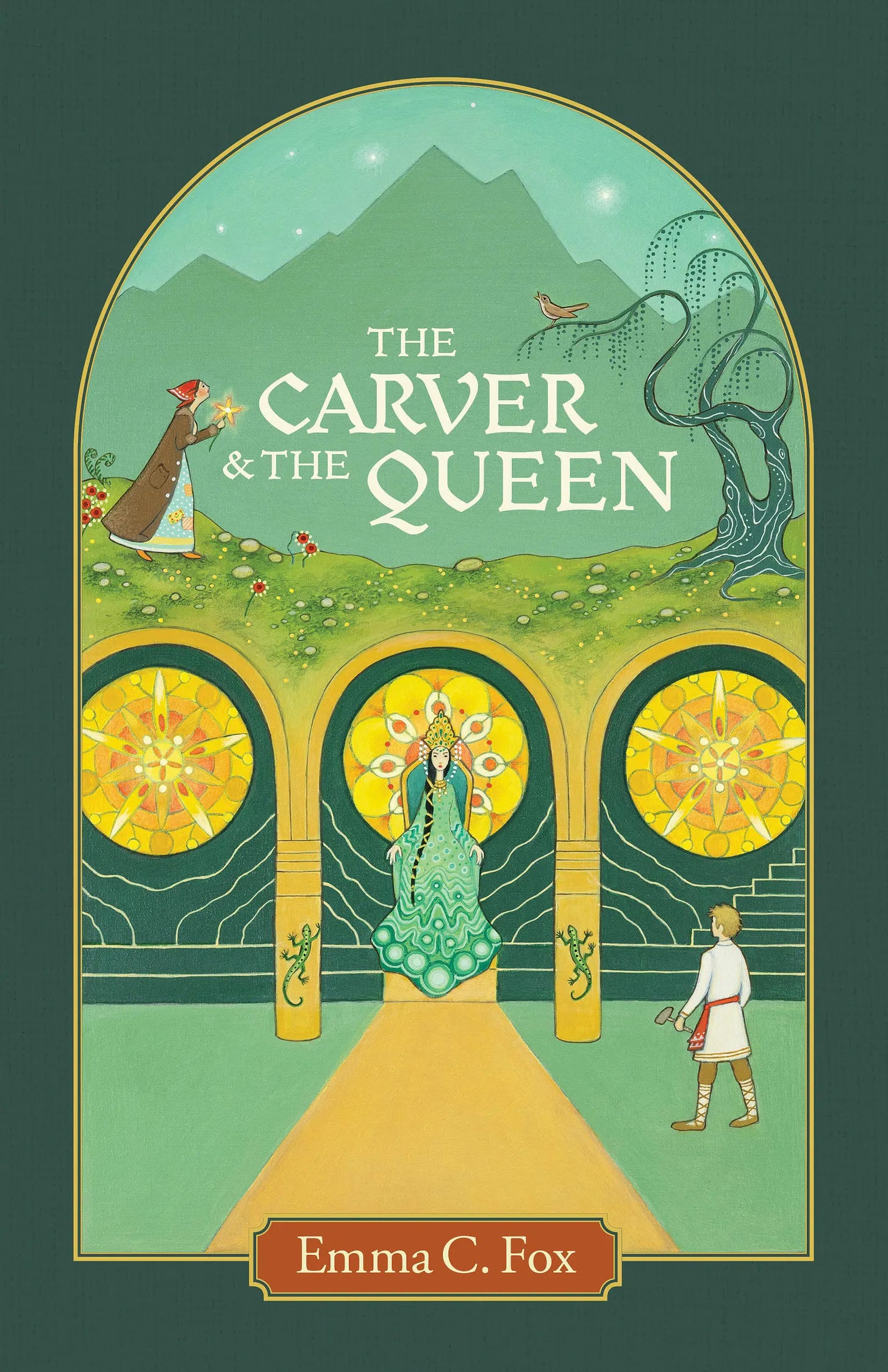Old Enough
(February 2024 PSOPH)
Hi, I’m Rianna Cohen, a speculative fiction writer and hot chocolate aficionado currently reading The Fairy Tellers1. There’s a poll below, so be sure to vote:)
Happy Leap Day, friends. Which is to say, happy birthday to J from fifth grade (who, wherever he is, must be closing in on ten years old….) And thank you to those who took a leap of faith in my future work and made pledges! If you’re so inclined, you too can show your support here:
By happenstance, I found myself reading two books based on Russian tales.
The first, written by Nicholas Kotar and based on Prince Ivan (yes, my classical music friends, there are firebirds, though they aren’t the focus), The Song of the Sirin is an epic fantasy that reads like a fairy tale.

The other is Emma Fox’s The Carver and the Queen, an upper Middle Grade/lower Young Adult which reads like a classic and is based on “Pavel Bazhov’s collection of Ural folktales in The Malachite Box.”
For some time, I’ve been thinking about the way we—and I—tell stories. It’s actually one of the reasons I set aside a manuscript last fall—one I’d been working on for years and was, arguably, only a few revisions away from sending to literary agents.
In my effort to wrangle the story into something readable, I crossed a line and the story started to feel formulaic, homogenous. Somewhere along the way—between books and articles and videos and courses about writing—I stopped telling the story my way and started writing it the way ‘the market’ or ‘the writing experts’ dictated.
This is why, for the moment, I’ve mostly stopped reading ‘contemporary’ and traditionally published books. So many of them feel empty to me. Like there’s something missing beneath the veneer of atmospheric settings and sentences, like there are hollow spaces holding up break-neck plots.
Perhaps that’s why these two books felt like fresh air.
There’s a C.S. Lewis quote which has long been one of my favorites:
Some day you will be old enough to start reading fairy tales again.
To me, this reads like a compass, a call to the imagination and innocence of childhood. A return from what is wordly to what matters. A reminder of the heart of things.
Lewis implies that it takes time—embracing the flashier stories, perhaps becoming a prodigal son—before we turn back to something which, though simpler and subtler, maybe even “old-fashioned,” feels inherently truer.
I think I’m old enough.
And I’m not the only one craving what is old, slow, simple, familiar. Certainly since the peak of the pandemic, but also before, we’ve seen a resurgence in record players and typewriters. Fashion has returned to pinafore dresses, tweed, and scrunchies. Interior design is full of dark portrait walls and candlelight. People are knitting and stitching and baking.
Maybe it’s all a reaction to the chaos of the world, but maybe we’re also searching for something deeper, something more than what the bland offerings of the world have been serving for decades.
The religious response to this is, of course, that what we truly hunger for is God. But I think it’s also true to say, generally, we’ve really watered down art—across all forms and mediums. Perhaps the two go hand-in-hand.
Yet, as The Song of the Sirin and The Carver and the Queen show, it’s still possible to form compelling stories. And ‘deeper’ doesn’t necessarily mean complicated.
Another of my favorite quotes (perhaps there is a theme amongst them):
It is no bad thing to celebrate a simple life.
J.R.R. Tolkien
And so I find myself asking: what is a simple life? Is it Little House on the Prairie 2.0? Is it a uniform? Is it minimalism?
Why do these two stories told simply have roots while many bestsellers feel simple and rootless? Is it possible, in the shadow of Covid-19 and with technology giants breathing down our necks, we’re disinterested in depth? How many of us have forgotten how to communicate, how to be together? Have we disconnected to such a degree that we’ve also lost touch with how to connect through art?
Is that why so many of the stories I’m reading feel like they swim in the shallows?
Stories, of course, aren’t always told with words.
Petr—short for Petrushka—one of The Carver and the Queen’s two main characters plays a zhaleika. From what I’ve gathered, the single-reed instrument is spelled a multitude of ways, is typically handmade, and is part of the hornpipe family (which is why it sounds like it could be at home in the Highland Games).
The zhaleika2 called to mind the telenka, an overtone flute which much of the world learned about during Eurovision a couple years ago (the bulk of which can be heard beginning at 2:20):
(You can watch the official Eurovision video here. In addition, although the song was not written for or about the current war, Kalush Orchestra released a music video highlighting the conflict.)
Here is the telenka in a more natural setting:
Music also plays an important role in The Song of the Sirin—no surprise there, as the author is a musician. Between the two books and listening to eastern instruments, I couldn’t help but wonder when we stopped gathering to make music, when it stopped being such a part of family and daily life. (Because, as any musicology student or regency-era-reader knows (if they didn’t sleep through everything), families and friends—even enemies!—used to regularly perform music for one another.)
And perhaps therein lies an answer of sorts, or at least a place to begin the search for a deeper, simpler life, one filled with stories that matter: perhaps it is not enough to simply gather, but to create for one another when we gather. Whether it is resurrecting salons (not the hairdresser) to make music together or reading excerpts of poetry or stories aloud, let’s bring back the community of ‘the good ol’ days’ rather than focusing so heavily on the aesthetics of hygge or nostalgia or academia etc.
Finally (phew, did you even read all that?), we approach the end. Just an announcement and the Coda left. :)
In the interest of sharing stories, I’ve started work on a new series called Oma at the Opera, which will examine the opera programs and librettos kept by my grandmother. The first edition, arriving (I hope) in March, will discuss Benjamin Britten’s The Rape of Lucretia which, as its name suggests, contains violent content. As it is impossible to discuss the opera’s plot without at least mentioning these subjects, reader discretion is advised. (It’s been tricky to begin with this one—though impossible to avoid if I’d like to be chronological—as I fear it will put a lot of people off the series. But, while not all operas contain disturbing situations like Lucretia, opera itself never shies away from exploring life’s ugliness.) If you cannot ‘tune in’ for the first edition, I hope you will give the subsequent ones a try.
Now it’s time to practice your decision making. Would you like to see this new series in your inbox (one extra email per month at most?) or would you like it to live here on substack with a link provided in my monthly email?
Until next time, may you read aloud with your families, perform music (badly, even—it matters not) with your friends, and read the old books from your shelves,
Rianna
February…
Moods: Water Goblin (a tone poem based on a very disturbing poem which begs to be a short story…), Dynamiden (a Viennese Waltz with this magnificent subtitle: ‘Mysterious Powers of Magnetism’)
Read3: The Mysteries, The Legend of Hobart, this New Yorker Kate DiCamillo profile, Acts of the Apostles, Romans
Wrote: Outline for a new MG Fantasy; Rough revision ideas for January’s MG
Faileddiscarded newsletter posts on technology & on decisions
Made: More cake pops (improvement in the aesthetics department—the key, my friends, is to not get gluttonous. Keep them small and submerge them entirely in the chocolate for an even coat), hot cross buns, lots of laundry
Up Next:
Music: Qoboz trial—superior streaming audio quality h/t Dad :)
Reading: Olivetti by
Writing: MG2 drafting (send thoughts, prayers, hot chocolate)
Making: calls with friends, sourdough starter…?
More: writing letters, time with family
Less: comparison, complaining



From my February photos
These are also affiliate links which means, should your bookish self make a purchase after clicking said link I will make a commission. May discontinue these, they’re kind of annoying.
Which I could not find satisfactory examples for, though there are several demonstrations of modern plastic instruments and scalar demonstrations of handmade zhaleikas on YouTube.
Affiliate links (see “1”).




Last night we had a family “sharing” night, of sorts. My eleven year old son presented a speech on Napoleon, my twelve year old read us his essay on the second siege of Vienna and I read “If”. Everyone agreed we need to do it again. There was something so pleasurable about sitting together, with the warmth of the fire and hearing about each other’s passions in a more-formal-than-the-dinner-table but still rather relaxed manner. As you were talking about human connection and the depth of relationships, and engagement through the arts, I couldn’t help but savor the beauty of that memory and want to shout “yes! Exactly!”.
I do believe that human connection and thematic depth has been compromised, but I’m also so excited to see attention drawn to the richness that is within our grasp if we just pivot a little bit. Sometimes one needs some fluff and nonsense to get lost in, but as a side dish, not a main course.
Thank you so much for this well thought out post! I’m very excited for your series on the opera coming up.